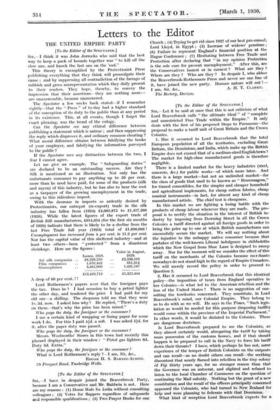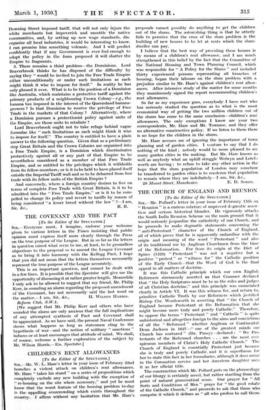[To the Editor of the SPECTATOR.]
Sra,—Let it be said at once that this is not criticism of what Lord Beaverbrook calls " the ultimate ideal " of " complete and unrestricted Free Trade within the Empire." It only deals with the first of his proposed Steps to Parnassus—the proposal to make a tariff unit of Great Britain and the Crown Colonies.
1. Has it occurred to Lord Beaverbrook that the total European population of all the territories, excluding Great Britain, the Dominions, and India, which make up the British Empire does not exceed that of a medium-sized English town?. The market for high-class manufactured goods is therefore negligible.
There is a limited market for the heavy industries (steel, concrete, &e.) for public works—of which more later. And there is a large market—but not an unlimited market—for the class of goods that used to be known as " Brummagem," for tinned comestibles, for the simpler and cheaper household and agricultural implements, for cheap cotton fabrics, cheap musical instruments—in fact, for almost any kind of cheap manufactured article. The chief test is cheapness.
In this market we are fighting a losing battle with the products of cheap labour wherever they are made. The pro- posal is to rectify the situation in the interest of British in- dustry by imposing from Downing Street in all the Crown Colonies a tariff directed against all foreign goods in order to bring the price up to one at which British manufactures can successfully secure the market. We will say nothing about the injustice to the unhappy native consumer because that partakes of the well-known Liberal indulgence in shibboleths which the New Gospel from Shoe Lane is designed to sweep away. Nor for the moment will we consider the effect of this tariff on the merchants of the Colonies because merchants nowadays do not stand high in the regard of Empire Crusaders. We will merely record the policy in order to proceed to Question 2.
2. Has it occurred to Lord Beaverbrook that this identical policy—the imposition of taxes from England operative in her Colonies—is what led to the -American rebellion and the loss of the United States ? There is no suggestion of con- sulting the territories concerned. They constitute, in Lord Beaverbrook's mind, our Colonial Empire. They belong to us to do with as we will. He says in the Times, "Such legis- lation as would be needed for this purpose (imposing tariffs) would come within the province of the Imperial Parliament." In other words, it would be dictated to the Colonies. These are dangerous doctrines.
Is Lord Beaverbrook prepared to see the Colonists, as they almost certainly would, abrogating the tariff by taking mass possession of the customs houses, and if that should happen is he prepared to call in the Navy to force his tariff down their throats? I have, which perhaps he has not, some experience of the temper of British Colonists on the outposts and can recall—as no doubt others can -recall—the seething discontent that nearly flamed into rebellion in the tiny colony Of Fiji thirty years . ago, for no stronger reason than that the Governor was an autocrat, and slighted and refused to listen to the local Chamber of Commerce on the question of continuing the Mail subsidy. Nothing but the grant of a new constitution and the recall of the officers principally concerned appeased the Colonists, who hid turned to New Zealand for help and were planning to federate with that- D'orninion. -
What kind of reception Lord Beaverbrook expects for a, Downing Street imposed tariff, that will not only injure the white merchants but impoverish and unsettle • the native communities, and, by setting up new wage standards, dis- organize all local industries, it would be interesting to know. I can promise him something volcanic. And I will predict confidently that if any Government is ever fool enough to adopt the policy in the form proposed it will shatter the Empire to fragments. - 3. There remains a third problem—the Dominions. Lord Beaverbrook thinks he has disposed of the difficulty by saying they " would be invited to join the Free Trade Empire either unconditionally or under such limitations as each might think it wise to impose for itself." In reality he has only glossed it over. -What is to be the position of a Dominion like Australia, which maintains a protective tariff against the primary products of a neighbouring Crown Colony—e.g., the banana tax imposed in the interest of the Queensland banana- growers ? Is that Dominion to receive the privilege of Free Trade in the markets of that Colony ? Alternatively, where a Dominion pursues a protectionist policy against units of the Empire, are those units to retaliate ?
Lord Beaverbrook ought not to take refuge behind vague formulae like " such limitations as each might think it wise to impose for itself." The country is entitled to have a plain answer to the following question. Given that as a preliminary step Great Britain and the Crown Colonies are organized into a Free Trade Empire, is a Dominion which discriminates protectively against all or any part of that Empire to be nevertheless considered as a member of that Free Trade Empire, and so entitled to the privileges which it withholds from its fellow-members ; or is it to be held to have placed itself outside the Imperial Tariff wall and so to be debarred from free trade with its fellow units of the British Empire ?
And conversely, where a foreign country desires to live on terms of complete Free Trade with Great Britain, is it to be admitted into the " Free Trade Empire," or is it to be com- pelled to change its policy and revert to tariffs by reason of being considered " a lesser breed without the law " ?—I am,

























































 Previous page
Previous page